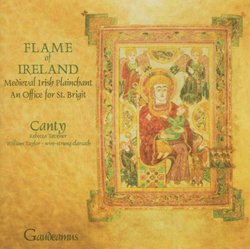| All Artists: Canty Title: Flame of Ireland Members Wishing: 0 Total Copies: 0 Label: Gaudeamus Release Date: 2/22/2005 Genre: Classical Styles: Opera & Classical Vocal, Historical Periods, Early Music Number of Discs: 1 SwapaCD Credits: 1 UPC: 743625035421 |
Search - Canty :: Flame of Ireland
 | Canty Flame of Ireland Genre: Classical
|
Larger Image |
CD Details |
CD ReviewsGorgeous recording of a fascinating liturgy Carl McColman | Clarkston, GA USA | 09/13/2005 (5 out of 5 stars) "If you love medieval chant and have even a mild interest in Celtic spirituality, here's a must-own recording of four women singing a Matins service for the feast of St. Brigit of Kildare (February 1, the Christianised holiday of Imbolc). Reminiscent of the work of the American quartet Anonymous 4, this recording offers a glimpse of what a Latin prayer service sung in an Irish convent a thousand years ago might have sounded like. The service itself combines traditional elements of Christian worship (such as the Venite, Psalm 95) with a variety of unique antiphons, canticles and readings that celebrate the mythic life of Brigit. The liner notes provide English translations of the Latin text, so those of us who are philistines can fully appreciate the powerful evocations of the Divine Feminine: "The King of Heaven had regard / To the handmaid of low estate / Of whom he brought forth Brigit / The noble child / The appearing of this child / Many portents / Did foretell, prefiguring / Great joy to come / By night her mother's cot / Was all ablaze with light / Which presaged the merits / Of the infant in her womb" and, "The Bishops from Britain foretell her / Her birth the Druids glorify / The shining stars of Heaven foretell her / For a fiery halo / Ethereal splendour announce the saint." The vocals are nothing short of splendid - when you listen, give this CD your full attention and be prepared to be transported into another world. Finally, note should be made of the use of the wire-strung harp to accompany the four women's voices. Although the instrument as used in this recording was played improvisationally, it is based on a mounting body of evidence that the harp was used as accompaniment in medieval religious music."
|

 Track Listings (33) - Disc #1
Track Listings (33) - Disc #1